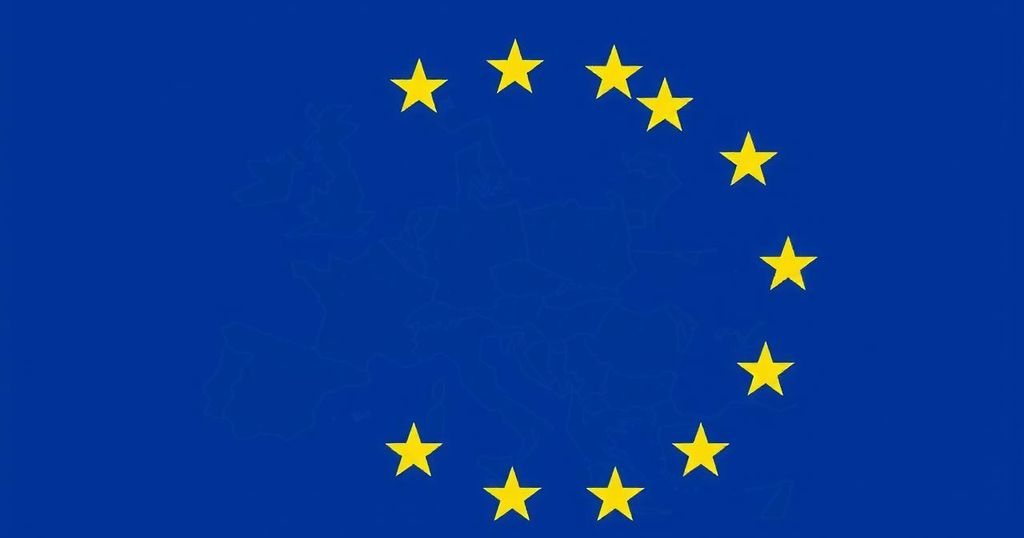Georgia’s EU Ambitions Central to Upcoming 2024 Elections

As Georgia nears its 2024 elections, aspirations for EU membership dominate the political discourse, with significant public support for joining the EU. The ruling Georgian Dream party faces criticism for allegedly moving the country away from Europe despite having previously championed EU accession. The political atmosphere, marred by fears of authoritarianism and societal divisions, could lead to a protest vote favoring pro-EU parties in search of a more stable and secure future.
As the 2024 elections approach in Georgia, the capital city of Tbilisi is adorned with the blue of the European Union flag alongside the white of the Georgian state flag. This visual representation reflects the centrality of Georgia’s aspiration to join the EU, a commitment that has been constitutionally recognized since 2018. Public opinion consistently shows that approximately 80% of Georgians support EU membership, indicating a strong collective desire for European integration. Ironically, the party that is currently viewed as obstructing this aspiration is the ruling Georgian Dream party, which pioneered the push for EU accession five years ago. Their campaign slogan, “Yes to the EU — but with dignity!” suggests a preference for negotiations on their terms. The nation stands at a critical juncture, with the choice starkly posed as “Europe or Russia,” as articulated by Renata Skardziute-Kereselidze from the Georgian Institute of Politics. The potential for governmental suppression against opposition parties, alongside repression of independent media, exacerbates fears concerning the country’s political health. Despite these challenges, the longevity of the ruling party, which has held power for three terms, raises questions about its ability to sustain control amid rising criticism. Changes in governance could invigorate Georgian democracy; however, no opposition faction seems poised to claim victory decisively without adopting a pro-EU narrative. Georgians are raising pertinent questions around what EU membership entails and how the rights of minorities can be ensured within a society heavily influenced by the Georgian Orthodox Church. The current government’s campaign also invokes fears stemming from Russia’s invasion of Ukraine. Slogans advocating for peace, juxtaposed with images of war-torn Ukraine, implore citizens to see the ruling party as the sole guarantor of stability, positioning opposition forces as threats to security. Former Prime Minister Bidzina Ivanishvili has controversially linked the promotion of LGBTQ+ rights with societal peril, stating that opposition rule could lead to war in Georgia within a day. The Georgian Dream party has rallied around the defense of so-called traditional family values, echoing sentiments reminiscent of Russian policies. Recent legislation comparable to those in Russia requires organizations funded by foreign entities to disclose their affiliations, stalling Georgia’s EU accession discussions after the granting of candidate status earlier in the year. The European Parliament has emphasized that progress in bilateral relations is contingent upon retracting such legislation. Social activists warn that the government distracts from its shortcomings by instigating division. An LGBTQ+ rights advocate, Tamar Jakeli, notes widespread dissatisfaction with the ruling party’s failure to deliver on commitments to social welfare. Many young Georgians express a desire to leave the country should conditions remain unchanged after the elections, highlighting a dire need for better living circumstances. Public sentiment in Tbilisi leans heavily towards swift EU accession, with citizens articulating hopes for pro-EU coalitions to emerge triumphant in the elections. They perceive this as an opportunity for Georgia to reestablish its path towards a European future, distancing itself from Russian allegiance. Political analysts anticipate that the election will serve as a protest against the current administration, positioning the desire for EU ties as a priority over a retreat towards Russian influence. This election signifies more than mere governance; it embodies a collective movement towards stability and security rooted in European affiliation, symbolized by the blue of the EU flag, in contrast to the colors of Russian symbolism.
Georgia, a former Soviet republic, has long grappled with its identity and alliances since gaining independence in 1991. Its ambition to join the European Union has gained momentum, particularly with constitutional enshrinement in 2018. The populace consistently expresses overwhelming support for EU membership, reflecting a shift towards European integration and away from Russian influence. The country’s socio-political climate is influenced by the Orthodox Church and ongoing tensions with Russia, especially in light of recent events surrounding Ukraine, which complicate its political landscape and public discourse. The ruling party’s tactics, including legislation mirroring Russian precedents, highlight a growing ideological divide and pose significant implications for Georgia’s future as it approaches a pivotal election.
The approaching elections in Georgia will likely serve as a crucial referendum on the country’s aspirations for EU integration versus the potential for further entrenchment within Russian sphere of influence. The ruling Georgian Dream party’s manipulative tactics, juxtaposed with a yearning among citizens for improved social conditions and European ties, set the stage for a significant political shift. A successful protest vote against the ruling party could signal a renewed commitment among Georgians towards EU membership and a rejection of divisive tactics that threaten the fabric of democracy and societal cohesion in Georgia.
Original Source: www.dw.com








